Contemporary Management Issues, Talent & Change Management: Unilever
VerifiedAdded on 2023/06/15
|8
|1970
|207
Report
AI Summary
This report analyzes contemporary management issues affecting businesses in the 21st century, focusing on Unilever. It explores external factors shaping human capital development, the role of information and communication technology (ICT) in workforce management, and existing policies for talent acquisition, learning, development, and change management. The report also provides recommendations for new initiatives to address challenges like Covid-19, emphasizing remote work, employee training, and motivation. It highlights the crucial role of leaders in implementing these changes, making decisions, communicating effectively, and engaging employees. The report concludes by summarizing the impact of Covid-19, the importance of adapting to new ways of working, and the significance of leadership in driving organizational change.
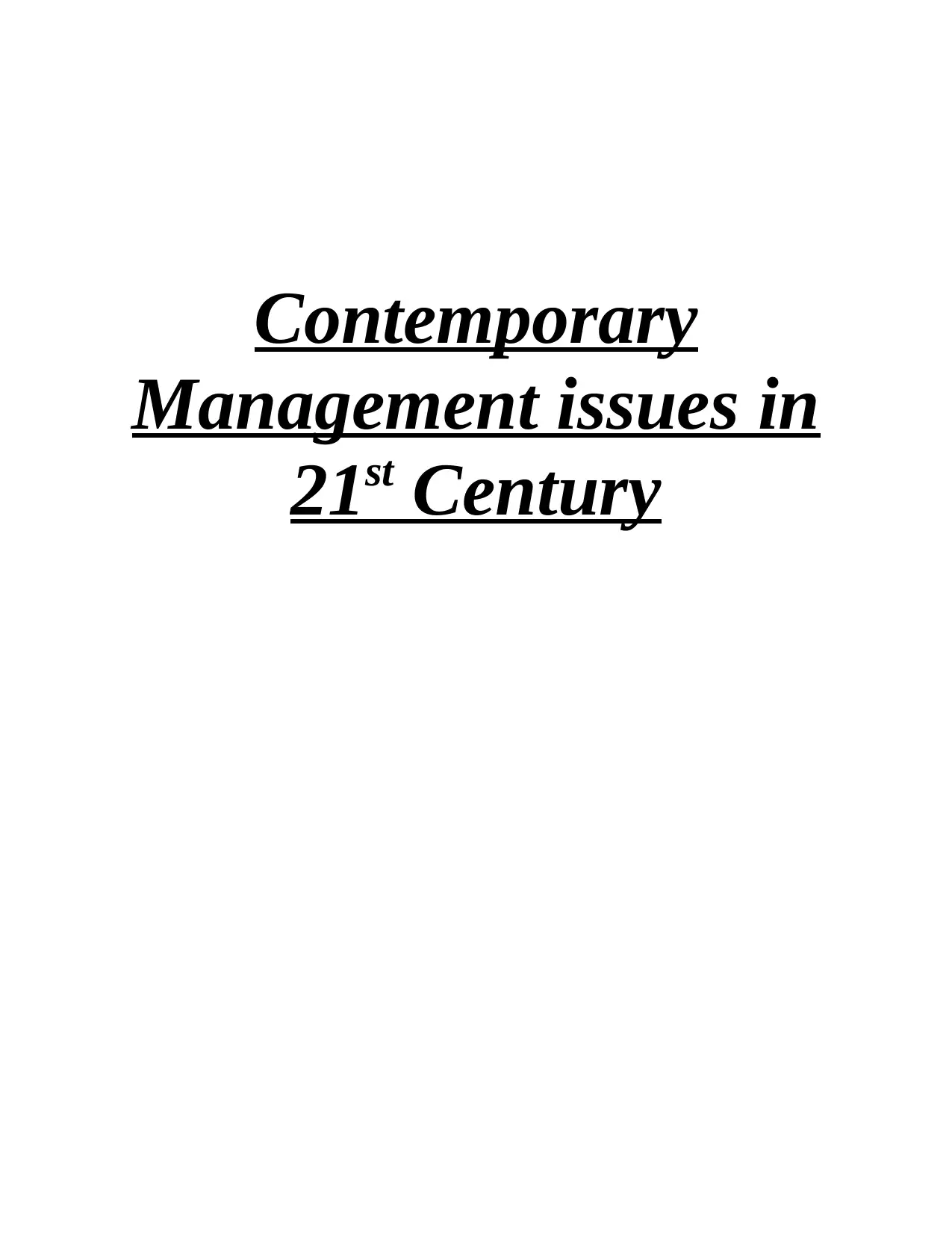
Contemporary
Management issues in
21st Century
Management issues in
21st Century
Paraphrase This Document
Need a fresh take? Get an instant paraphrase of this document with our AI Paraphraser
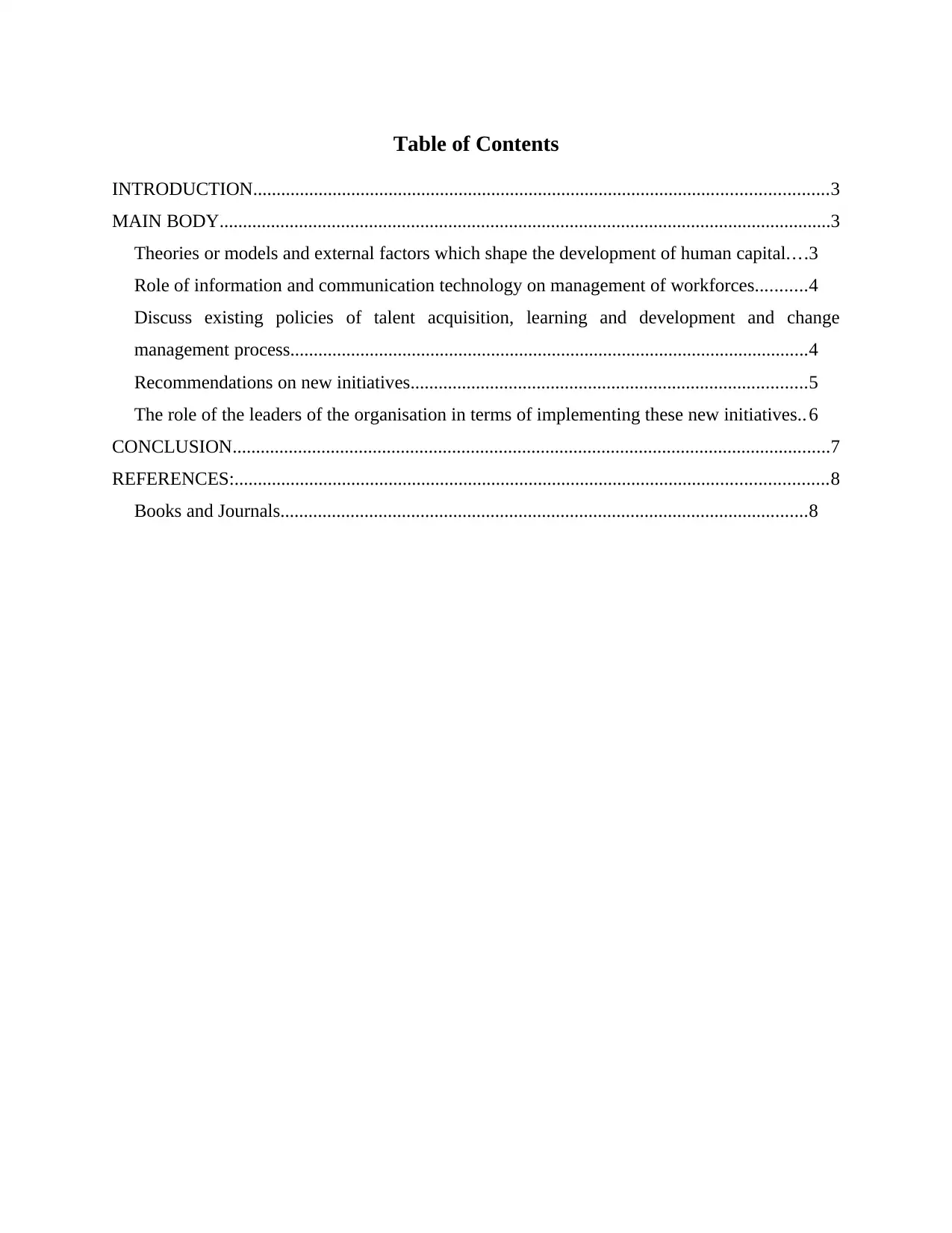
Table of Contents
INTRODUCTION...........................................................................................................................3
MAIN BODY...................................................................................................................................3
Theories or models and external factors which shape the development of human capital....3
Role of information and communication technology on management of workforces...........4
Discuss existing policies of talent acquisition, learning and development and change
management process...............................................................................................................4
Recommendations on new initiatives.....................................................................................5
The role of the leaders of the organisation in terms of implementing these new initiatives.. 6
CONCLUSION................................................................................................................................7
REFERENCES:...............................................................................................................................8
Books and Journals.................................................................................................................8
INTRODUCTION...........................................................................................................................3
MAIN BODY...................................................................................................................................3
Theories or models and external factors which shape the development of human capital....3
Role of information and communication technology on management of workforces...........4
Discuss existing policies of talent acquisition, learning and development and change
management process...............................................................................................................4
Recommendations on new initiatives.....................................................................................5
The role of the leaders of the organisation in terms of implementing these new initiatives.. 6
CONCLUSION................................................................................................................................7
REFERENCES:...............................................................................................................................8
Books and Journals.................................................................................................................8
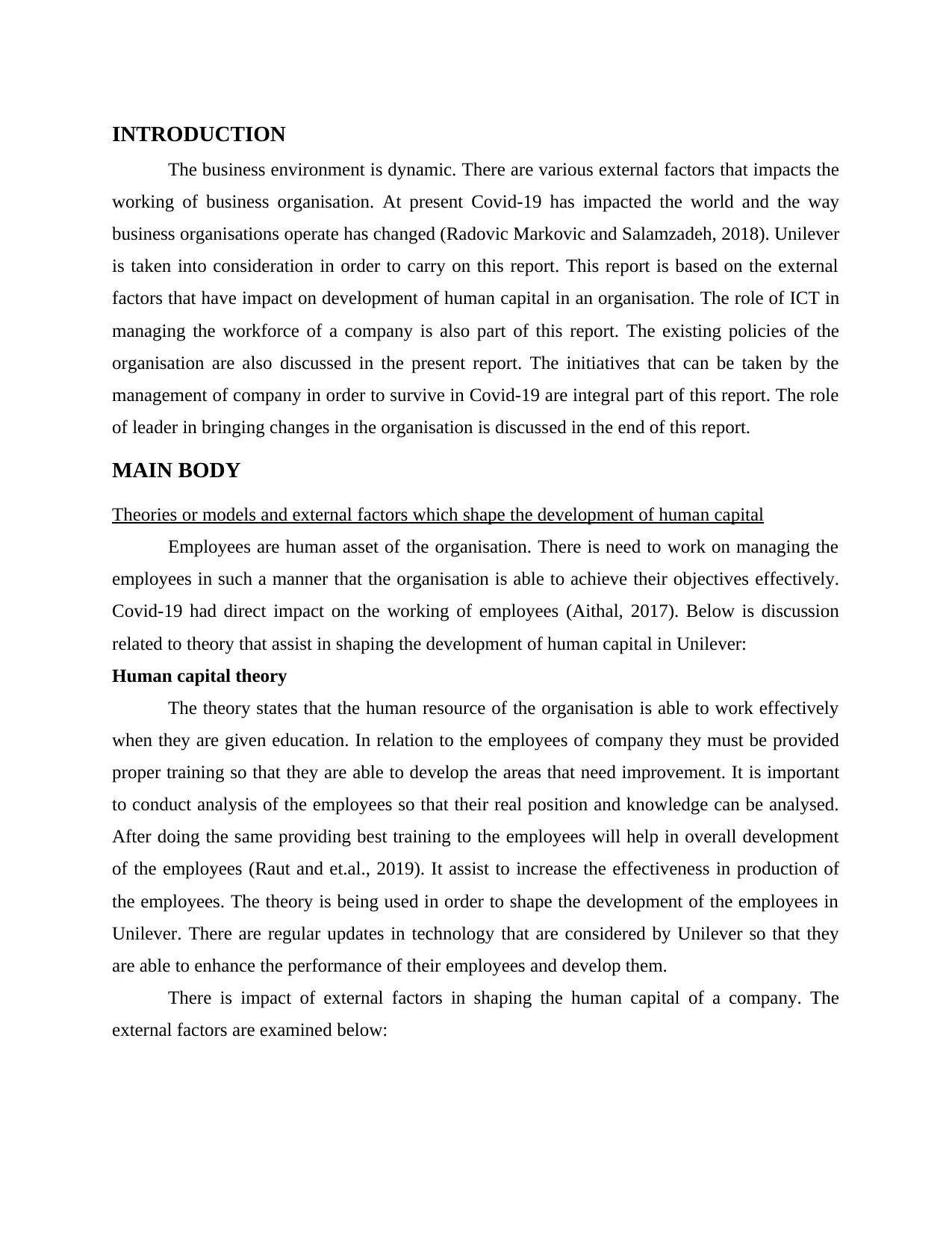
INTRODUCTION
The business environment is dynamic. There are various external factors that impacts the
working of business organisation. At present Covid-19 has impacted the world and the way
business organisations operate has changed (Radovic Markovic and Salamzadeh, 2018). Unilever
is taken into consideration in order to carry on this report. This report is based on the external
factors that have impact on development of human capital in an organisation. The role of ICT in
managing the workforce of a company is also part of this report. The existing policies of the
organisation are also discussed in the present report. The initiatives that can be taken by the
management of company in order to survive in Covid-19 are integral part of this report. The role
of leader in bringing changes in the organisation is discussed in the end of this report.
MAIN BODY
Theories or models and external factors which shape the development of human capital
Employees are human asset of the organisation. There is need to work on managing the
employees in such a manner that the organisation is able to achieve their objectives effectively.
Covid-19 had direct impact on the working of employees (Aithal, 2017). Below is discussion
related to theory that assist in shaping the development of human capital in Unilever:
Human capital theory
The theory states that the human resource of the organisation is able to work effectively
when they are given education. In relation to the employees of company they must be provided
proper training so that they are able to develop the areas that need improvement. It is important
to conduct analysis of the employees so that their real position and knowledge can be analysed.
After doing the same providing best training to the employees will help in overall development
of the employees (Raut and et.al., 2019). It assist to increase the effectiveness in production of
the employees. The theory is being used in order to shape the development of the employees in
Unilever. There are regular updates in technology that are considered by Unilever so that they
are able to enhance the performance of their employees and develop them.
There is impact of external factors in shaping the human capital of a company. The
external factors are examined below:
The business environment is dynamic. There are various external factors that impacts the
working of business organisation. At present Covid-19 has impacted the world and the way
business organisations operate has changed (Radovic Markovic and Salamzadeh, 2018). Unilever
is taken into consideration in order to carry on this report. This report is based on the external
factors that have impact on development of human capital in an organisation. The role of ICT in
managing the workforce of a company is also part of this report. The existing policies of the
organisation are also discussed in the present report. The initiatives that can be taken by the
management of company in order to survive in Covid-19 are integral part of this report. The role
of leader in bringing changes in the organisation is discussed in the end of this report.
MAIN BODY
Theories or models and external factors which shape the development of human capital
Employees are human asset of the organisation. There is need to work on managing the
employees in such a manner that the organisation is able to achieve their objectives effectively.
Covid-19 had direct impact on the working of employees (Aithal, 2017). Below is discussion
related to theory that assist in shaping the development of human capital in Unilever:
Human capital theory
The theory states that the human resource of the organisation is able to work effectively
when they are given education. In relation to the employees of company they must be provided
proper training so that they are able to develop the areas that need improvement. It is important
to conduct analysis of the employees so that their real position and knowledge can be analysed.
After doing the same providing best training to the employees will help in overall development
of the employees (Raut and et.al., 2019). It assist to increase the effectiveness in production of
the employees. The theory is being used in order to shape the development of the employees in
Unilever. There are regular updates in technology that are considered by Unilever so that they
are able to enhance the performance of their employees and develop them.
There is impact of external factors in shaping the human capital of a company. The
external factors are examined below:
⊘ This is a preview!⊘
Do you want full access?
Subscribe today to unlock all pages.

Trusted by 1+ million students worldwide
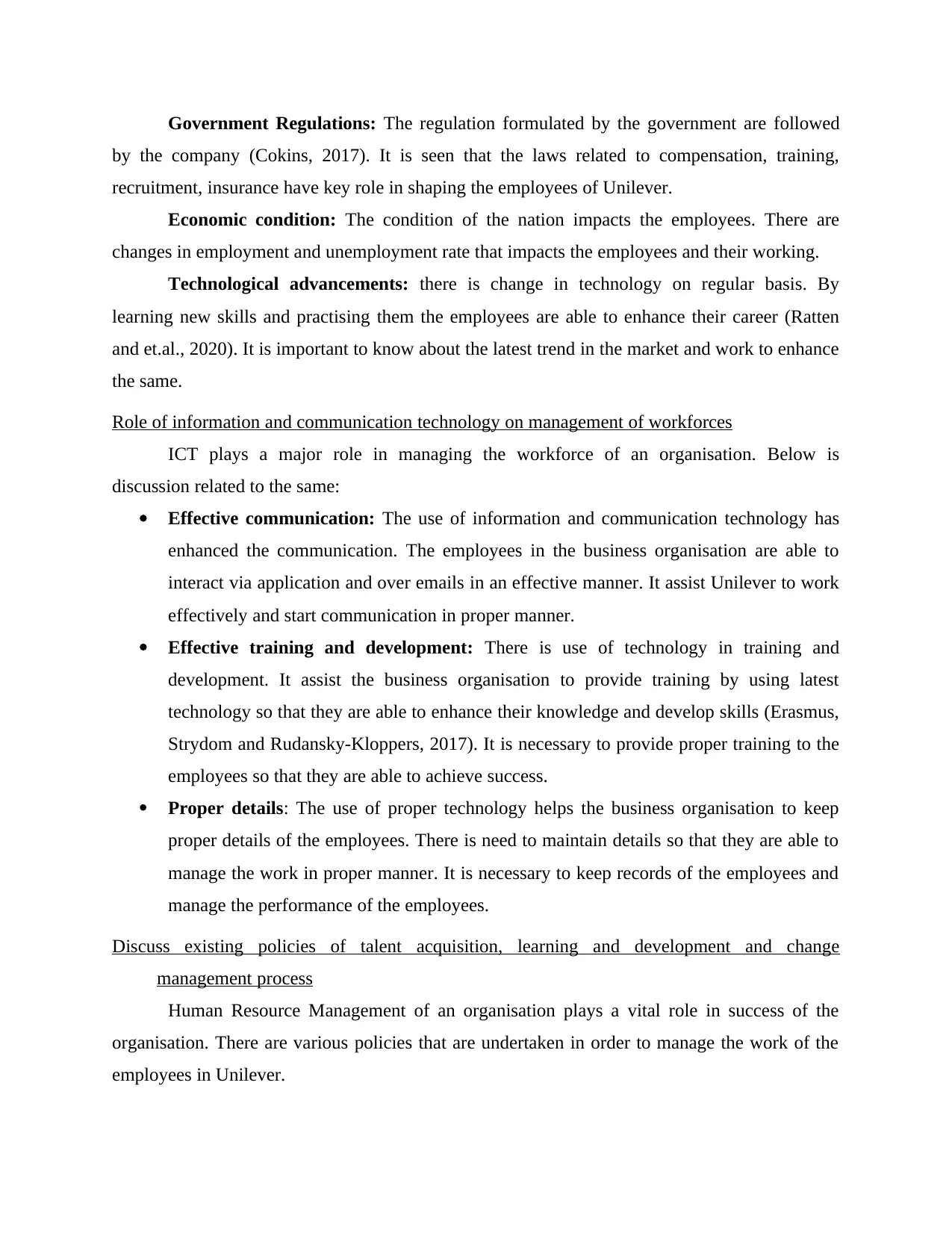
Government Regulations: The regulation formulated by the government are followed
by the company (Cokins, 2017). It is seen that the laws related to compensation, training,
recruitment, insurance have key role in shaping the employees of Unilever.
Economic condition: The condition of the nation impacts the employees. There are
changes in employment and unemployment rate that impacts the employees and their working.
Technological advancements: there is change in technology on regular basis. By
learning new skills and practising them the employees are able to enhance their career (Ratten
and et.al., 2020). It is important to know about the latest trend in the market and work to enhance
the same.
Role of information and communication technology on management of workforces
ICT plays a major role in managing the workforce of an organisation. Below is
discussion related to the same:
Effective communication: The use of information and communication technology has
enhanced the communication. The employees in the business organisation are able to
interact via application and over emails in an effective manner. It assist Unilever to work
effectively and start communication in proper manner.
Effective training and development: There is use of technology in training and
development. It assist the business organisation to provide training by using latest
technology so that they are able to enhance their knowledge and develop skills (Erasmus,
Strydom and Rudansky-Kloppers, 2017). It is necessary to provide proper training to the
employees so that they are able to achieve success.
Proper details: The use of proper technology helps the business organisation to keep
proper details of the employees. There is need to maintain details so that they are able to
manage the work in proper manner. It is necessary to keep records of the employees and
manage the performance of the employees.
Discuss existing policies of talent acquisition, learning and development and change
management process
Human Resource Management of an organisation plays a vital role in success of the
organisation. There are various policies that are undertaken in order to manage the work of the
employees in Unilever.
by the company (Cokins, 2017). It is seen that the laws related to compensation, training,
recruitment, insurance have key role in shaping the employees of Unilever.
Economic condition: The condition of the nation impacts the employees. There are
changes in employment and unemployment rate that impacts the employees and their working.
Technological advancements: there is change in technology on regular basis. By
learning new skills and practising them the employees are able to enhance their career (Ratten
and et.al., 2020). It is important to know about the latest trend in the market and work to enhance
the same.
Role of information and communication technology on management of workforces
ICT plays a major role in managing the workforce of an organisation. Below is
discussion related to the same:
Effective communication: The use of information and communication technology has
enhanced the communication. The employees in the business organisation are able to
interact via application and over emails in an effective manner. It assist Unilever to work
effectively and start communication in proper manner.
Effective training and development: There is use of technology in training and
development. It assist the business organisation to provide training by using latest
technology so that they are able to enhance their knowledge and develop skills (Erasmus,
Strydom and Rudansky-Kloppers, 2017). It is necessary to provide proper training to the
employees so that they are able to achieve success.
Proper details: The use of proper technology helps the business organisation to keep
proper details of the employees. There is need to maintain details so that they are able to
manage the work in proper manner. It is necessary to keep records of the employees and
manage the performance of the employees.
Discuss existing policies of talent acquisition, learning and development and change
management process
Human Resource Management of an organisation plays a vital role in success of the
organisation. There are various policies that are undertaken in order to manage the work of the
employees in Unilever.
Paraphrase This Document
Need a fresh take? Get an instant paraphrase of this document with our AI Paraphraser
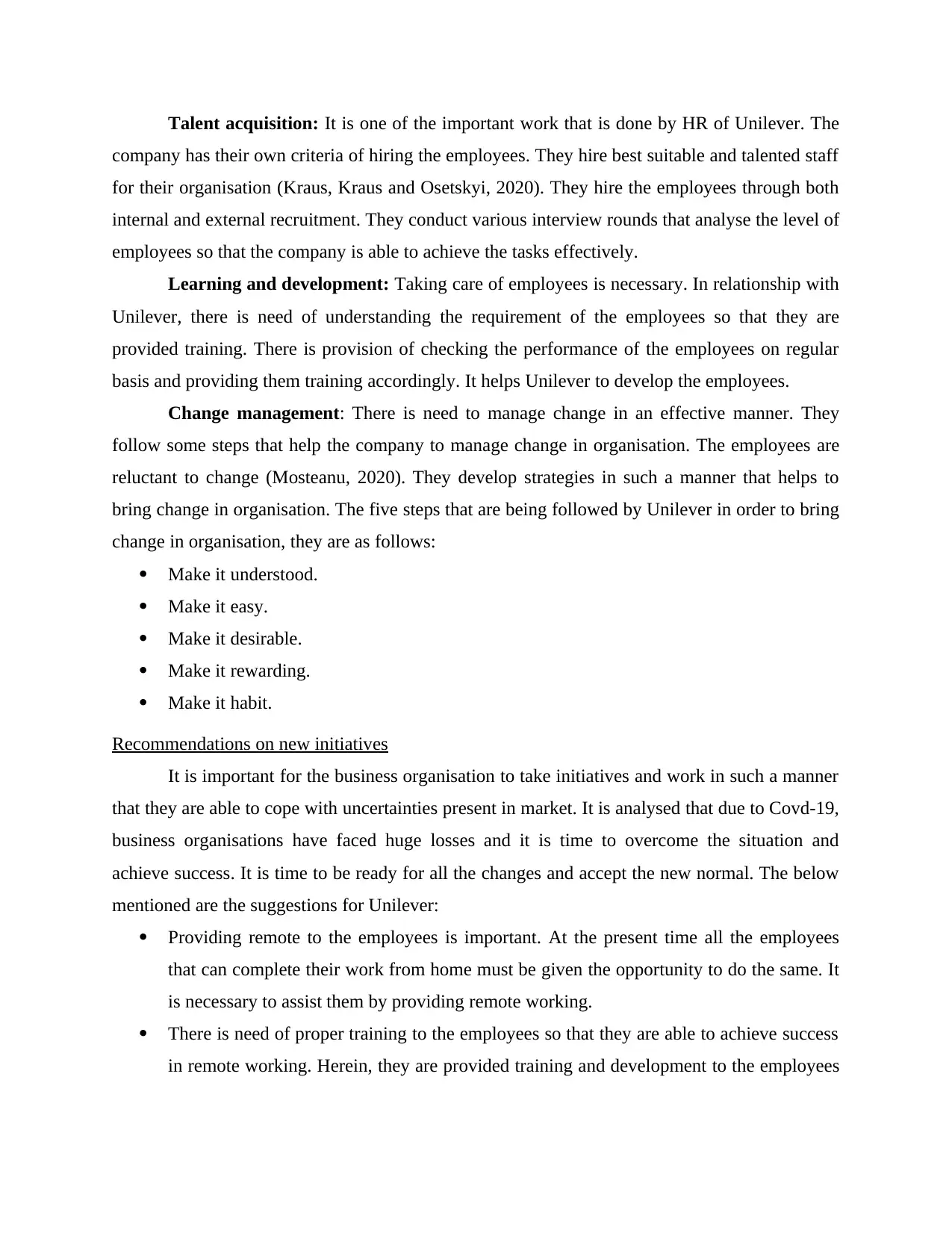
Talent acquisition: It is one of the important work that is done by HR of Unilever. The
company has their own criteria of hiring the employees. They hire best suitable and talented staff
for their organisation (Kraus, Kraus and Osetskyi, 2020). They hire the employees through both
internal and external recruitment. They conduct various interview rounds that analyse the level of
employees so that the company is able to achieve the tasks effectively.
Learning and development: Taking care of employees is necessary. In relationship with
Unilever, there is need of understanding the requirement of the employees so that they are
provided training. There is provision of checking the performance of the employees on regular
basis and providing them training accordingly. It helps Unilever to develop the employees.
Change management: There is need to manage change in an effective manner. They
follow some steps that help the company to manage change in organisation. The employees are
reluctant to change (Mosteanu, 2020). They develop strategies in such a manner that helps to
bring change in organisation. The five steps that are being followed by Unilever in order to bring
change in organisation, they are as follows:
Make it understood.
Make it easy.
Make it desirable.
Make it rewarding.
Make it habit.
Recommendations on new initiatives
It is important for the business organisation to take initiatives and work in such a manner
that they are able to cope with uncertainties present in market. It is analysed that due to Covd-19,
business organisations have faced huge losses and it is time to overcome the situation and
achieve success. It is time to be ready for all the changes and accept the new normal. The below
mentioned are the suggestions for Unilever:
Providing remote to the employees is important. At the present time all the employees
that can complete their work from home must be given the opportunity to do the same. It
is necessary to assist them by providing remote working.
There is need of proper training to the employees so that they are able to achieve success
in remote working. Herein, they are provided training and development to the employees
company has their own criteria of hiring the employees. They hire best suitable and talented staff
for their organisation (Kraus, Kraus and Osetskyi, 2020). They hire the employees through both
internal and external recruitment. They conduct various interview rounds that analyse the level of
employees so that the company is able to achieve the tasks effectively.
Learning and development: Taking care of employees is necessary. In relationship with
Unilever, there is need of understanding the requirement of the employees so that they are
provided training. There is provision of checking the performance of the employees on regular
basis and providing them training accordingly. It helps Unilever to develop the employees.
Change management: There is need to manage change in an effective manner. They
follow some steps that help the company to manage change in organisation. The employees are
reluctant to change (Mosteanu, 2020). They develop strategies in such a manner that helps to
bring change in organisation. The five steps that are being followed by Unilever in order to bring
change in organisation, they are as follows:
Make it understood.
Make it easy.
Make it desirable.
Make it rewarding.
Make it habit.
Recommendations on new initiatives
It is important for the business organisation to take initiatives and work in such a manner
that they are able to cope with uncertainties present in market. It is analysed that due to Covd-19,
business organisations have faced huge losses and it is time to overcome the situation and
achieve success. It is time to be ready for all the changes and accept the new normal. The below
mentioned are the suggestions for Unilever:
Providing remote to the employees is important. At the present time all the employees
that can complete their work from home must be given the opportunity to do the same. It
is necessary to assist them by providing remote working.
There is need of proper training to the employees so that they are able to achieve success
in remote working. Herein, they are provided training and development to the employees
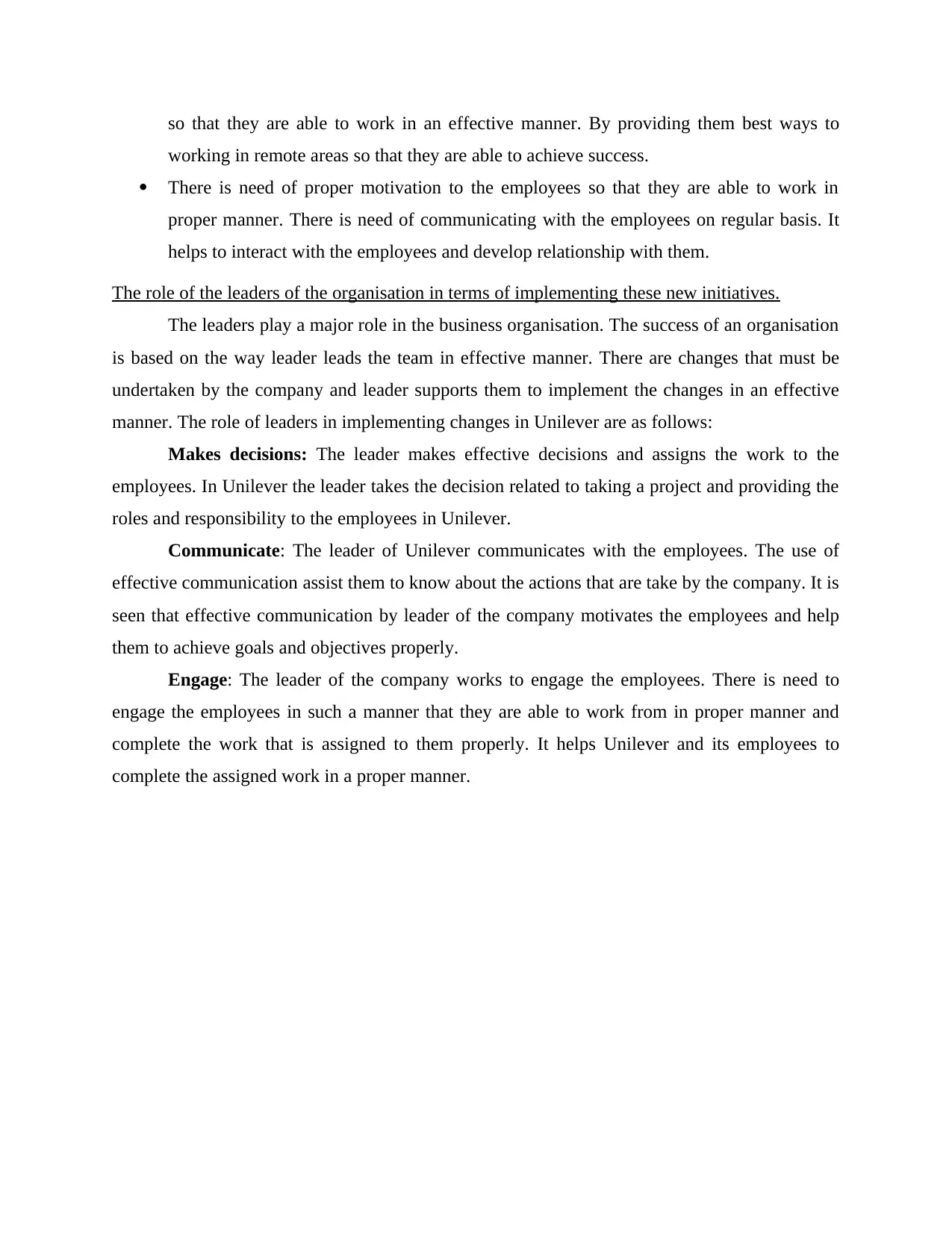
so that they are able to work in an effective manner. By providing them best ways to
working in remote areas so that they are able to achieve success.
There is need of proper motivation to the employees so that they are able to work in
proper manner. There is need of communicating with the employees on regular basis. It
helps to interact with the employees and develop relationship with them.
The role of the leaders of the organisation in terms of implementing these new initiatives.
The leaders play a major role in the business organisation. The success of an organisation
is based on the way leader leads the team in effective manner. There are changes that must be
undertaken by the company and leader supports them to implement the changes in an effective
manner. The role of leaders in implementing changes in Unilever are as follows:
Makes decisions: The leader makes effective decisions and assigns the work to the
employees. In Unilever the leader takes the decision related to taking a project and providing the
roles and responsibility to the employees in Unilever.
Communicate: The leader of Unilever communicates with the employees. The use of
effective communication assist them to know about the actions that are take by the company. It is
seen that effective communication by leader of the company motivates the employees and help
them to achieve goals and objectives properly.
Engage: The leader of the company works to engage the employees. There is need to
engage the employees in such a manner that they are able to work from in proper manner and
complete the work that is assigned to them properly. It helps Unilever and its employees to
complete the assigned work in a proper manner.
working in remote areas so that they are able to achieve success.
There is need of proper motivation to the employees so that they are able to work in
proper manner. There is need of communicating with the employees on regular basis. It
helps to interact with the employees and develop relationship with them.
The role of the leaders of the organisation in terms of implementing these new initiatives.
The leaders play a major role in the business organisation. The success of an organisation
is based on the way leader leads the team in effective manner. There are changes that must be
undertaken by the company and leader supports them to implement the changes in an effective
manner. The role of leaders in implementing changes in Unilever are as follows:
Makes decisions: The leader makes effective decisions and assigns the work to the
employees. In Unilever the leader takes the decision related to taking a project and providing the
roles and responsibility to the employees in Unilever.
Communicate: The leader of Unilever communicates with the employees. The use of
effective communication assist them to know about the actions that are take by the company. It is
seen that effective communication by leader of the company motivates the employees and help
them to achieve goals and objectives properly.
Engage: The leader of the company works to engage the employees. There is need to
engage the employees in such a manner that they are able to work from in proper manner and
complete the work that is assigned to them properly. It helps Unilever and its employees to
complete the assigned work in a proper manner.
⊘ This is a preview!⊘
Do you want full access?
Subscribe today to unlock all pages.

Trusted by 1+ million students worldwide
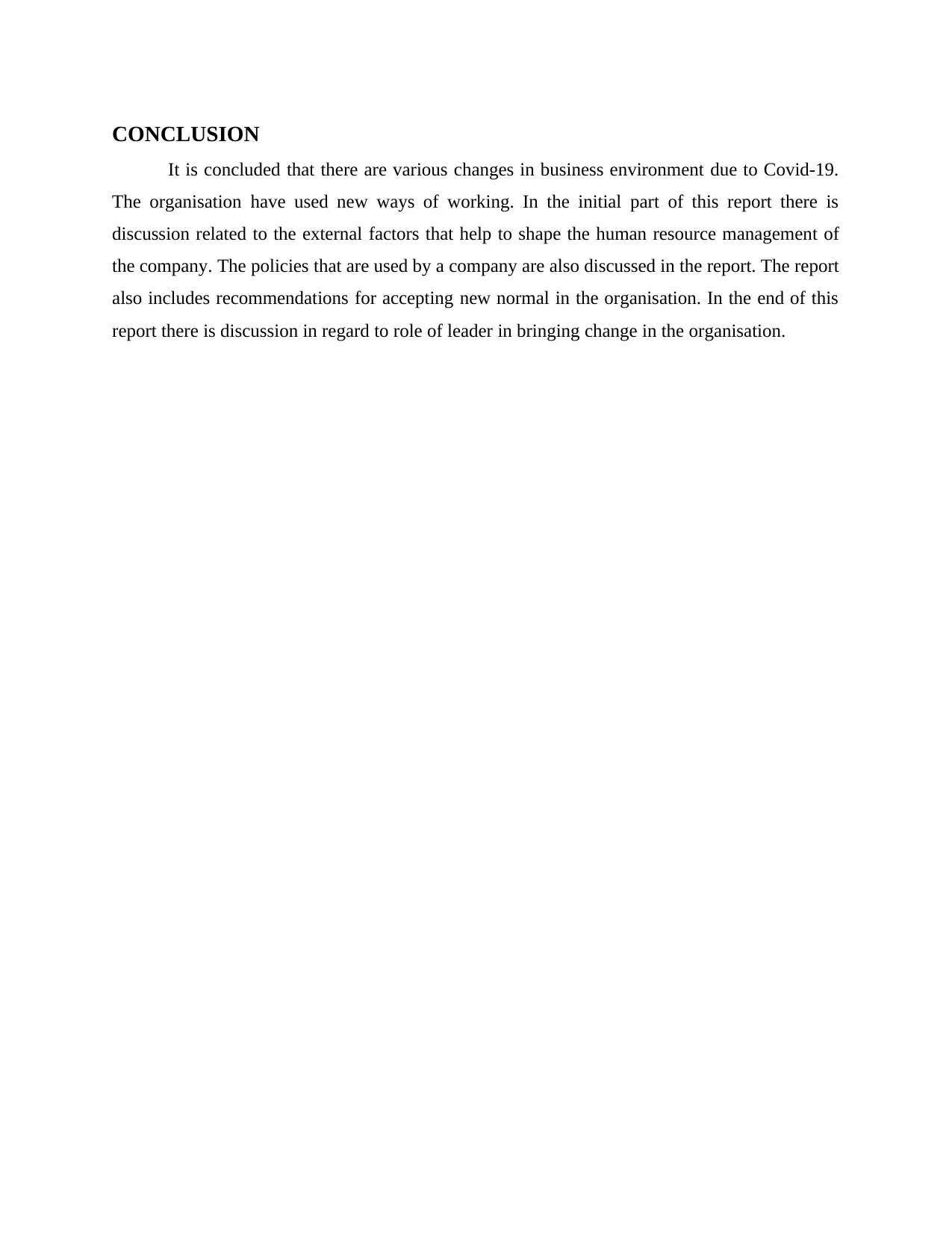
CONCLUSION
It is concluded that there are various changes in business environment due to Covid-19.
The organisation have used new ways of working. In the initial part of this report there is
discussion related to the external factors that help to shape the human resource management of
the company. The policies that are used by a company are also discussed in the report. The report
also includes recommendations for accepting new normal in the organisation. In the end of this
report there is discussion in regard to role of leader in bringing change in the organisation.
It is concluded that there are various changes in business environment due to Covid-19.
The organisation have used new ways of working. In the initial part of this report there is
discussion related to the external factors that help to shape the human resource management of
the company. The policies that are used by a company are also discussed in the report. The report
also includes recommendations for accepting new normal in the organisation. In the end of this
report there is discussion in regard to role of leader in bringing change in the organisation.
Paraphrase This Document
Need a fresh take? Get an instant paraphrase of this document with our AI Paraphraser
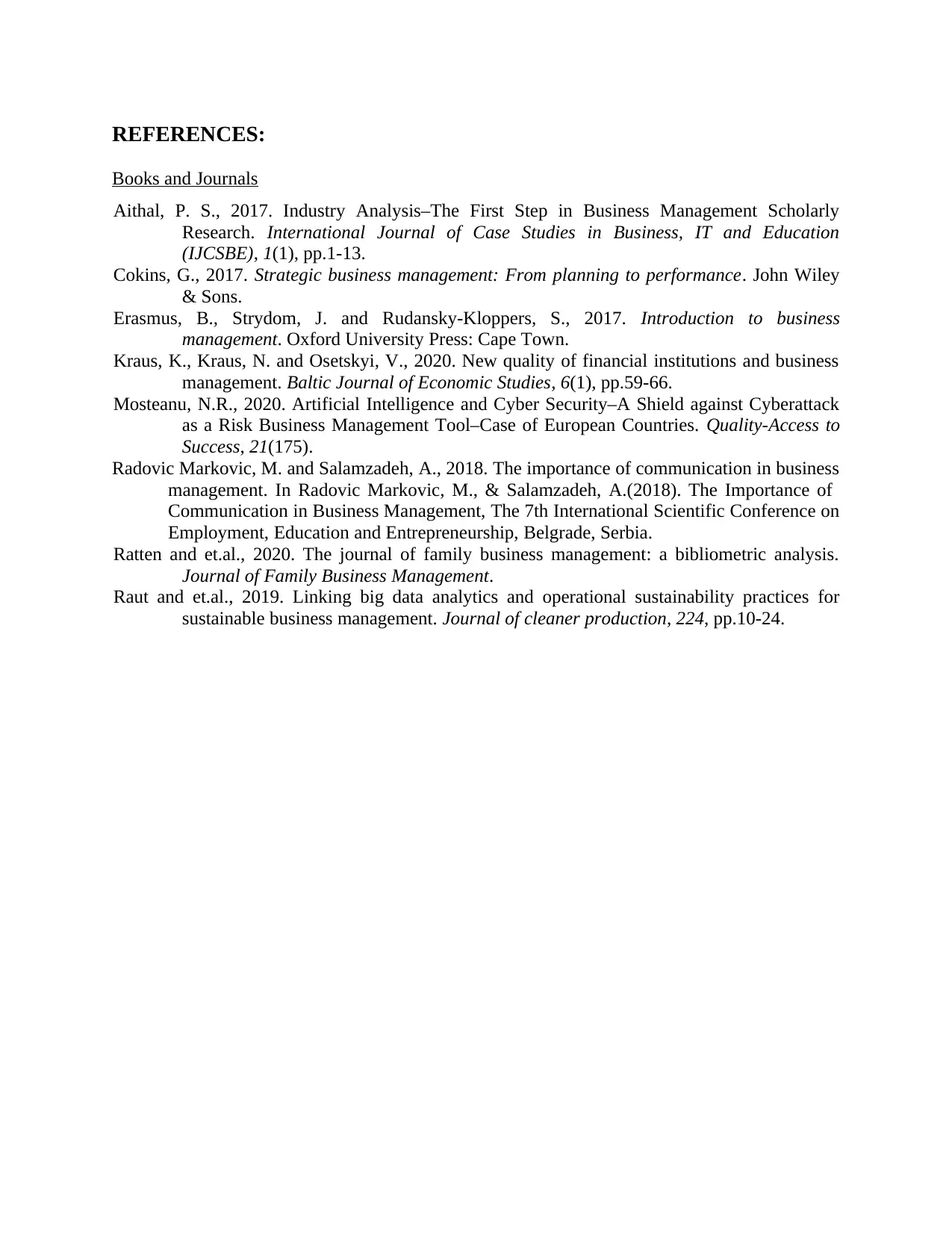
REFERENCES:
Books and Journals
Aithal, P. S., 2017. Industry Analysis–The First Step in Business Management Scholarly
Research. International Journal of Case Studies in Business, IT and Education
(IJCSBE), 1(1), pp.1-13.
Cokins, G., 2017. Strategic business management: From planning to performance. John Wiley
& Sons.
Erasmus, B., Strydom, J. and Rudansky-Kloppers, S., 2017. Introduction to business
management. Oxford University Press: Cape Town.
Kraus, K., Kraus, N. and Osetskyi, V., 2020. New quality of financial institutions and business
management. Baltic Journal of Economic Studies, 6(1), pp.59-66.
Mosteanu, N.R., 2020. Artificial Intelligence and Cyber Security–A Shield against Cyberattack
as a Risk Business Management Tool–Case of European Countries. Quality-Access to
Success, 21(175).
Radovic Markovic, M. and Salamzadeh, A., 2018. The importance of communication in business
management. In Radovic Markovic, M., & Salamzadeh, A.(2018). The Importance of
Communication in Business Management, The 7th International Scientific Conference on
Employment, Education and Entrepreneurship, Belgrade, Serbia.
Ratten and et.al., 2020. The journal of family business management: a bibliometric analysis.
Journal of Family Business Management.
Raut and et.al., 2019. Linking big data analytics and operational sustainability practices for
sustainable business management. Journal of cleaner production, 224, pp.10-24.
Books and Journals
Aithal, P. S., 2017. Industry Analysis–The First Step in Business Management Scholarly
Research. International Journal of Case Studies in Business, IT and Education
(IJCSBE), 1(1), pp.1-13.
Cokins, G., 2017. Strategic business management: From planning to performance. John Wiley
& Sons.
Erasmus, B., Strydom, J. and Rudansky-Kloppers, S., 2017. Introduction to business
management. Oxford University Press: Cape Town.
Kraus, K., Kraus, N. and Osetskyi, V., 2020. New quality of financial institutions and business
management. Baltic Journal of Economic Studies, 6(1), pp.59-66.
Mosteanu, N.R., 2020. Artificial Intelligence and Cyber Security–A Shield against Cyberattack
as a Risk Business Management Tool–Case of European Countries. Quality-Access to
Success, 21(175).
Radovic Markovic, M. and Salamzadeh, A., 2018. The importance of communication in business
management. In Radovic Markovic, M., & Salamzadeh, A.(2018). The Importance of
Communication in Business Management, The 7th International Scientific Conference on
Employment, Education and Entrepreneurship, Belgrade, Serbia.
Ratten and et.al., 2020. The journal of family business management: a bibliometric analysis.
Journal of Family Business Management.
Raut and et.al., 2019. Linking big data analytics and operational sustainability practices for
sustainable business management. Journal of cleaner production, 224, pp.10-24.
1 out of 8
Related Documents
Your All-in-One AI-Powered Toolkit for Academic Success.
+13062052269
info@desklib.com
Available 24*7 on WhatsApp / Email
![[object Object]](/_next/static/media/star-bottom.7253800d.svg)
Unlock your academic potential
Copyright © 2020–2026 A2Z Services. All Rights Reserved. Developed and managed by ZUCOL.


